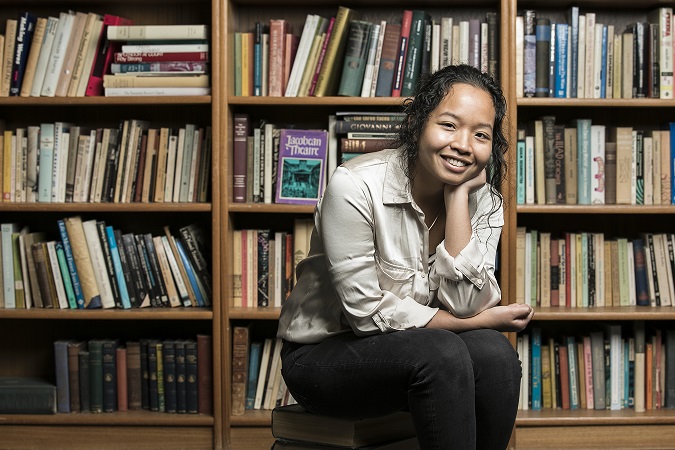Sofia Puente-Lay grew up on a college campus where her father, who is from South America, studied indigenous writers and also taught Spanish 101. Her mother is from Cambodia, and lived through the reign of the Khmer Rouge.
When Puente-Lay enrolled in George Mason University’s Creative Writing MFA program in fall 2017, she chose a special-topics workshop in which students look at ways to incorporate cultural heritage in their stories. She also enrolled in a craft seminar that looks at the styles and modes of newly written and published fiction, and a literature class that focuses on the modes of short story writing today.
“I came to Mason because I thought it was the perfect place for me,” Puente-Lay said. “The breadth and diversity of the professors, each with such a different perspective, was just what I wanted.”
Puente-Lay is the first designated recipient of the newly established Robert Raymond Scholarship. The scholarship, started by donor and George Mason adjunct professor Rosalind Gann, was established to support promising writers in the Mason graduate Creative Writing Program who are members of an underrepresented minority group, though the scholarship is open to all students in the program.
“It is important to have multiple voices in the room,” Gann said about the scholarship that bears her father’s name. Her father “loved literature, marched with Martin Luther King, and would have loved [Mason],” Gann said.
Puente-Lay was drawn to Mason because its strong program in writing is led by some of today’s most outstanding writers of fiction, as well as nonfiction and poetry.
“Already, the faculty have done so much to help me narrow what I want to develop and work on,” Puente-Lay said. “Professor Kyoko Mori helped me figure out how to navigate culture in prose, and Professor Helon Habila Ngalabak has given great lectures about fiction as witness and the importance of post-colonial literature.
“And I met with Professor Susan Shreve who helped me discover some insights about how to develop a unique voice.”
She also was attracted to the multi-step, phased-in approach that prepares students to become college professors at the same time that they are becoming stronger writers.
This story by William Miller originally appeared in the Spring 2018 issue of English Matters.


